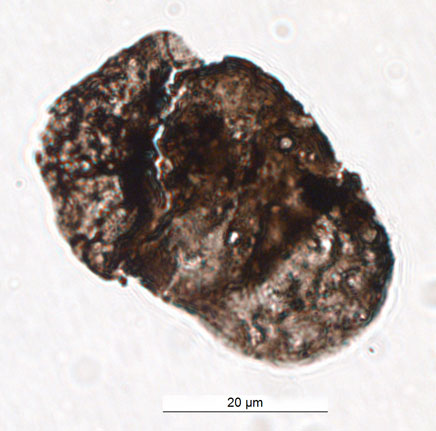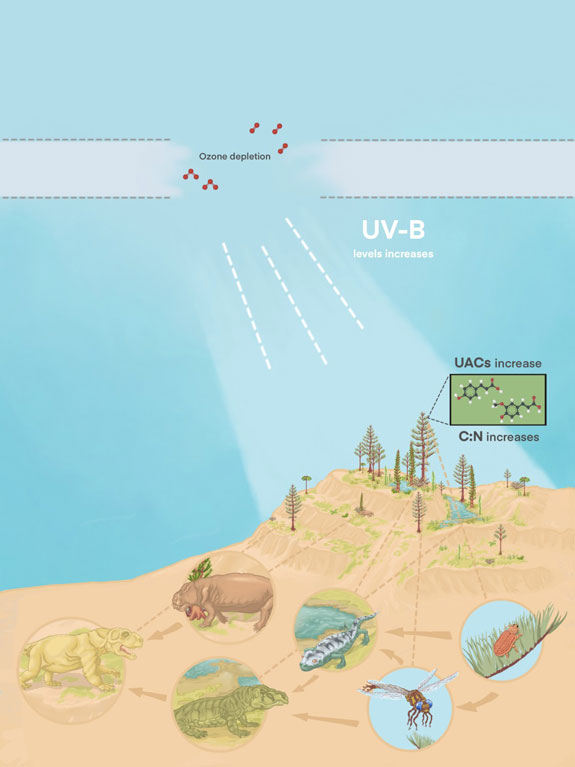Friday, 06 January 2023
New research has uncovered that pollen preserved in 250 million year old rocks contain compounds that function like sunscreen, these are produced by plants to protect them from harmful ultraviolet (UV-B) radiation. The findings suggests that a pulse of UV-B played an important part in the end Permian mass extinction event.
Scientists from the University of Nottingham, China, Germany and the UK led by Professor Liu Feng from Nanjing Institute of Geology and Palaeontology have developed a new method to detect plant’s sunscreen-like compounds in fossil pollen grains. The research has been published today in Science Advances.
The end-Permian mass extinction event (250 million years ago) is the most severe of the big five mass extinction events with the loss of ~80% of marine and terrestrial species. This catastrophic loss of biodiversity was a response to a palaeoclimate emergency triggered by the emplacement of a continental-scale volcanic eruption that covers much of modern-day Siberia. The volcanic activity drove the release of massive amounts of carbon that had been locked up in Earth’s interior into the atmosphere, generating large-scale greenhouse warming. Accompanying this global warming event was a collapse in the Earth’s ozone layer. Support for this theory comes from the abundant occurrence of malformed spores and pollen grains that testify to an influx of mutagenic UV irradiation.
Professor Barry Lomax from the University of Nottingham explains “Plants require sunlight for photosynthesis but need to protect themselves and particularly their pollen against the harmful effects of UV-B radiation. To do so, plants load the outer walls of pollen grains with compounds that function like sunscreen to protect the vulnerable cells to ensure successful reproduction.”
 Alisporites tenuicorpus, the pollen grain used in the study. The samples analysed are about half the width of a human hair. Photograph is courtesy of Prof Liu Feng from Nanjing Institute of Geology and Palaeontology
Alisporites tenuicorpus, the pollen grain used in the study. The samples analysed are about half the width of a human hair. Photograph is courtesy of Prof Liu Feng from Nanjing Institute of Geology and Palaeontology
Professor Liu Feng adds: “We have developed a method to detect these phenolic compounds in fossil pollen grains recovered from Tibet, and detected much higher concentrations in those grains that were produced during the mass extinction and peak phase of volcanic activity.”
Elevated UV-B levels can have even further-reaching and longer-lasting impacts on the entire Earth System. Recent modelling studies have demonstrated that elevated UV-B stress reduces plant biomass and terrestrial carbon storage, which would exacerbate global warming. The increased concentration of phenolic compounds also makes plant tissue less easily digestible, making a hostile environment even more challenging for herbivores.
 Schematic representation of how elevated UV-B radiation may have affected the broader terrestrial ecosystem. Image drawn by Conor Haynes-Mannering, University of Nottingham.
Schematic representation of how elevated UV-B radiation may have affected the broader terrestrial ecosystem. Image drawn by Conor Haynes-Mannering, University of Nottingham.
Summarising the groups findings Dr Wes Fraser based at Oxford Brookes University commented: “Volcanism on such a cataclysmic scale impacts on all aspects of the Earth system, from direct chemical changes in the atmosphere, through changes in carbon sequestration rates, to reducing volume of nutritious food sources available for animals.”
Story credits
More information is available from Professor Barry Lomax on Barry.Lomax@nottingham.ac.uk
Notes to editors:
About the University of Nottingham
Ranked 97 in the world and 17th in the UK by the QS World University Rankings, the University of Nottingham is a founding member of Russell Group of research-intensive universities. Studying at the University of Nottingham is a life-changing experience, and we pride ourselves on unlocking the potential of our students. We have a pioneering spirit, expressed in the vision of our founder Sir Jesse Boot, which has seen us lead the way in establishing campuses in China and Malaysia - part of a globally connected network of education, research and industrial engagement.
Nottingham was crowned Sports University of the Year by The Times and Sunday Times Good University Guide 2024 – the third time it has been given the honour since 2018 – and by the Daily Mail University Guide 2024.
The university is among the best universities in the UK for the strength of our research, positioned seventh for research power in the UK according to REF 2021. The birthplace of discoveries such as MRI and ibuprofen, our innovations transform lives and tackle global problems such as sustainable food supplies, ending modern slavery, developing greener transport, and reducing reliance on fossil fuels.
The university is a major employer and industry partner - locally and globally - and our graduates are the third most targeted by the UK's top employers, according to The Graduate Market in 2024 report by High Fliers Research.
We lead the Universities for Nottingham initiative, in partnership with Nottingham Trent University, a pioneering collaboration between the city’s two world-class institutions to improve levels of prosperity, opportunity, sustainability, health and wellbeing for residents in the city and region we are proud to call home.
More news…